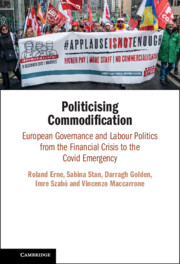‘An enduring legacy of the financial crisis is the EU’s embrace of a new economic governance regime, which imitates that of private sector multinational corporations. In this path-breaking, multi-dimensional comparative analysis, Erne and colleagues compellingly draw out the consequences for: the changed character of European integration; the (im)balance between the EU’s economic and social dimensions; the EU’s underdeveloped democratic polity; and counter interventions by social movements and organised labour.’
Paul Marginson - Emeritus Professor of Industrial Relations, University of Warwick
‘Politicising Commodification provides original and rigorous analysis of the EU’s new economic governance regime - from 2008 up to and including the Recovery and Resilience Facility - that calls academics and policymakers to pay heed to the democratic challenges that the EU must face.’
Imelda Maher - Sutherland Professor of European Law, University College Dublin
‘This is a trail-blazing book in several different ways. First, it develops a new approach to policy analysis that researchers in many fields will find helpful and worthy of imitation. Second, it presents original research on European Union policy on an unusual and instructive selection of countries and sectors. Finally, and perhaps most important, it shows how the study of policies must include conflict around and protest against those policies, and their impact in turn on the policymakers.’
Colin Crouch - Emeritus Professor, University of Warwick
‘This work analyses the post-2008 transformation of EU interventions on employment relations and public services from horizontal market integration to more vertical country-specific policy prescriptions, surveillance, and enforcement. It documents the extent to which this change offered concrete targets for contentious transnational counter-movements, but also generated obstacles to transnational collective action, setting countries in competition with one another. The book is a bold and fresh attempt to analyse EU politics with a commodification-decommodification approach rather than the usual national-EU axis.’
Stefano Bartolini - Emeritus Professor, European University Institute
‘This is a book for anyone interested in the dynamics of European integration. Rarely have the causes and consequences of ‘functional spill-over’ been so clearly captured and explored.’
Philippe C. Schmitter - Emeritus Professor, European University Institute
‘Politicising Commodification offers fascinating new insights on how the new economic governance in the EU is deployed differentially across member states and various policies. While strengthening integration, it also triggers important political responses by civil society. The book is key to understanding how European policymaking works.’
Adrienne Heritier - Emeritus Professor, European University Institute
‘Based on an original theoretical model and rich empirical evidence, this volume contributes much to our knowledge of the threats for democracy as well as the potential for resistance.’
Donatella della Porta - Professor of Political Sciences, Scuola Normale Superiore, Firenze
‘This book makes sense of the relationships between EU economic governance, policy developments, and political conflict in a unique - comparative, cross-sectoral, and longitudinal - fashion across labour markets, as well as transport, water, and healthcare services. It gathers an impressive sum of cutting-edge qualitative research providing the big picture as well as a critical assessment.’
Amandine Crespy - Professor of Political Science and EU Studies, Université libre de Bruxelles
‘Politicising Commodification constitutes a true tour de force.’
Martin Seeleib-Kaiser - Professor of Comparative Public Policy, Universität Tübingen
‘This is rich and ambitious book will be of interest to EU policy scholars across disciplines.’
Gráinne de Búrca - Professor of Law, European University Institute
‘This is an impressively detailed study of the EU’s new economic governance regime, which has imposed neoliberal prescriptions to some extent by stealth, as exemplified in four countries and three sectors. The authors offer a nuanced assessment of the possibilities for resistance.’
Richard Hyman - Emeritus Professor of Industrial Relations, London School of Economics and Political Science
‘This major research monograph charts the post-2008 shift from market-driven horizontal European integration to a political mode of vertical integration. As the authors make clear, it is trade unions and social movements that are in a key position to challenge the overarching commodification script. A must read for everyone interested in shifting Europe towards a union of social justice!’
Andreas Bieler - Professor of Political Economy, University of Nottingham
‘This book offers an empirically rich, methodologically innovative, and theoretically sophisticated analysis of the EU’s shift to its new economic governance regime after the financial crisis of 2008 and its political and social consequences.’
Elke Heins - Senior Lecturer in Social Policy, University of Edinburgh
‘This book is an essential contribution to the debate on EU governance, its relationship to labour politics, and the future of democratic governance in Europe.’
Paul Copeland - Professor of Public Policy, Queen Mary University of London



